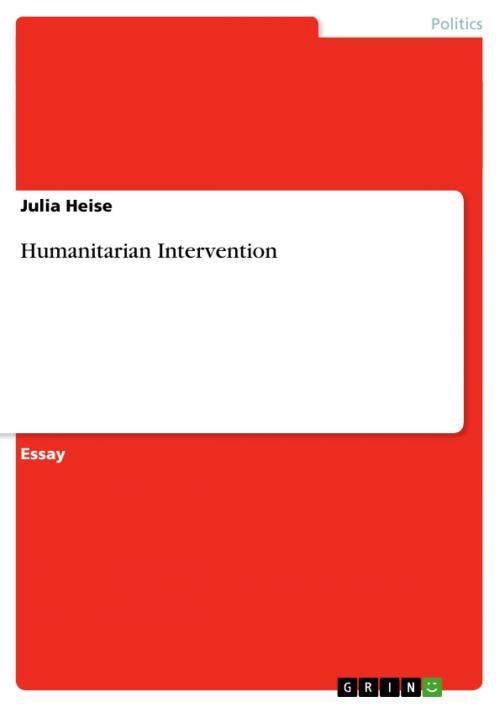Humanitarian Intervention
Nonfiction, Social & Cultural Studies, Political Science, International, International Security| Author: | Julia Heise | ISBN: | 9783638362269 |
| Publisher: | GRIN Publishing | Publication: | April 2, 2005 |
| Imprint: | GRIN Publishing | Language: | English |
| Author: | Julia Heise |
| ISBN: | 9783638362269 |
| Publisher: | GRIN Publishing |
| Publication: | April 2, 2005 |
| Imprint: | GRIN Publishing |
| Language: | English |
Essay from the year 2004 in the subject Politics - International Politics - Topic: Peace and Conflict Studies, Security, grade: 1,8, University of Edinburgh, 46 entries in the bibliography, language: English, abstract: Especially since the post-1945 era and the United Nations-establishment, international political theory has been concerned with the topic of humanitarian intervention and a complex debate, touching principles of international society and our human existence, has emerged. It focuses on two levels: the traditional debate is concerned with the arguments for and against intervention in relation to the principles of sovereignty, non-intervention and non-use of force versus global human rights norms. The critical approach to humanitarian intervention moves beyond the classical debate and its limits in providing new aspects.1 Additionally, the international society recently has to deal with lots of problems. 9/11 and the war in Iraq have given rise to new challenges and terrorism prescribes a new and unique dimension for humanitarian intervention. This essay aims to provide a clearer understanding of current issues and the complex debate concerning humanitarian intervention. Due to lack of space it can only give a rough overview about the topic. Thus it first offers a definition of humanitarian intervention and a brief historical overview about the UN. Secondly, it deals with the classical debate and related issues. The third section is concerned with critical approaches to and new ways of looking at intervention. The essay concludes by offering possible solutions to the debate. 1 The complexity of the debate has been perfectly expressed by Hoffman: 'The very act of intervention and non-intervention and the justification offered tells us a great deal - about how we conceive of ourselves, how we construct our identities and how we conceive of and construct the world in which we live.' (1993: 194)
Essay from the year 2004 in the subject Politics - International Politics - Topic: Peace and Conflict Studies, Security, grade: 1,8, University of Edinburgh, 46 entries in the bibliography, language: English, abstract: Especially since the post-1945 era and the United Nations-establishment, international political theory has been concerned with the topic of humanitarian intervention and a complex debate, touching principles of international society and our human existence, has emerged. It focuses on two levels: the traditional debate is concerned with the arguments for and against intervention in relation to the principles of sovereignty, non-intervention and non-use of force versus global human rights norms. The critical approach to humanitarian intervention moves beyond the classical debate and its limits in providing new aspects.1 Additionally, the international society recently has to deal with lots of problems. 9/11 and the war in Iraq have given rise to new challenges and terrorism prescribes a new and unique dimension for humanitarian intervention. This essay aims to provide a clearer understanding of current issues and the complex debate concerning humanitarian intervention. Due to lack of space it can only give a rough overview about the topic. Thus it first offers a definition of humanitarian intervention and a brief historical overview about the UN. Secondly, it deals with the classical debate and related issues. The third section is concerned with critical approaches to and new ways of looking at intervention. The essay concludes by offering possible solutions to the debate. 1 The complexity of the debate has been perfectly expressed by Hoffman: 'The very act of intervention and non-intervention and the justification offered tells us a great deal - about how we conceive of ourselves, how we construct our identities and how we conceive of and construct the world in which we live.' (1993: 194)















